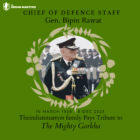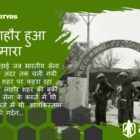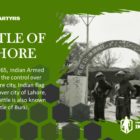|
Listen here
|

Gurbachan Singh Salaria was born on 29 November 1935, in Jamwal, Shakargarh village, Punjab. He was the second of five children of Parents Munshi Ram and Dhan Devi. during the British Indian army, his father used to serve with the Dogra Squadron of Hodson’s Horse. Therefore, Salaria inherited the tales bravely. At very young, he decided of becoming a part of the army like his father.
First graduate of NDA to win a PVC and also the only UN Peacekeeper to be awarded a Param Vir Chakra
Gurbachan Singh Salaria was very young when he saw the partition of India in 1947. After partition, Salaria’s family had to settle in the Gurdaspur district. But Partition did not affect his dreams and studies, in August 1947, he turned into transferred to the KGRIMC in Jalandhar. After passing out from KGRIMC, he joined the Joint Services Wing of the National Defence Academy (NDA). On graduating from the NDA in 1956, he enrolled inside the Indian Military Academy, finishing his research on 9 June 1957. Salaria becomes, to begin with, commissioned into the second battalion, three Gorkha Rifles but was later transferred to the third battalion, 1 Gorkha Rifles in March 1960.
It was only a few years after Gurbachan Singh Salaria joined the army that there was an atmosphere of the cold war in the world. Soon the Congo of Africa came into the grip of civil warfare. In June 1960, the Republic of the Congo has become independent from Belgium. But all through the first week of July, a mutiny broke out in the Congolese Army and violence erupted between black and white civilians. How extreme the situation become, it could be understood from this that the United Nations had to interfere on this matter, and the UN took the decision to sent the Indian military to bring the situation under control. Under which, a brigade inclusive of 3000 infantrymen and officials from India was sent for this mission. Captain Gurbachan Singh Salaria was also part of the mission.
On 24 November 1961, the rebels of Shombe, angered by the resolution of the UN Security Council, kidnapped two UN officials and killed their driver. Major Ajit Singh of the Gorkha Rifles was also among the two UN officials taken hostage by the rebels. As part of the conspiracy, on 5 December 1961, the rebels blocked all roads leading to Elizabeth Villa to stop UN forces. In view of the seriousness of the situation, the Gorkha Rifles were instructed to open these roads. At the same time, the rebels were already frightened of such military action, so masses of armed rebels had already gathered on the streets to take a front from the UN army. In view of the plans of the rebels, the UN army prepared its strategy. According to strategy, Charlie Company of the Gurkha Rifles was instructed to attack with Irish tanks. Under the instructions, it was decided that Captain Govind Sharma of the Gurkha Rifles would attack the rebels from one side, while Captain Gurbachan Singh would act from the airport side with Irish tanks. The strategy was designed in such a way that the rebels neither got a chance to escape from the spot nor could they carry out the attack.
On the afternoon of 5 December 1961, Captain Gurbachan Singh Salaria along with his team managed to reach the predetermined area on the Airport and waiting for the right time to act on the rebels. In the meantime, he noticed two-weapon cars installed as a blocker. The moment he was waiting for had arrived, without wasting time he destroyed both the cars with rocket launchers. This action of Captain Gurbachan Salaria caused panic among the rebels. He had understood that this was his chance to control the armed rebels.
Captain Gurbachan Singh Salaria and his men killed 40 out of 100 rebels. In the meantime, Captain Salaria’s neck was seriously injured due to automatic machine-gun fire by the rebels, but regardless of his wound, he continued to fight. This war was won by his bravery, but the battle of life got out of his control. He attained martyrdom on the battlefield.
It is the result of the fighting skills and bravery of Captain Salaria that the Gorkha Rifles were successful on this mission. In recognition of his unparalleled combat skills, bravery, and devotion to duty, the Captain was awarded the Param Vir Chakra, the Army’s highest honor. He was the first graduate of NDA to win a PVC and also the only UN Peacekeeper to be awarded a PVC.





